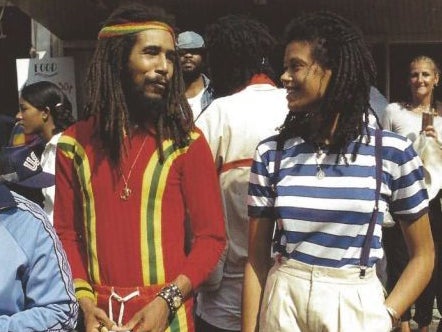Papa Weasel: Reggae deejay whose sound system served a famous shebeen and who toasted on Culture Club’s first No 1
Weasel ran Fathers, the legendary ground-floor shebeen in Notting Hill

Your support helps us to tell the story
From reproductive rights to climate change to Big Tech, The Independent is on the ground when the story is developing. Whether it's investigating the financials of Elon Musk's pro-Trump PAC or producing our latest documentary, 'The A Word', which shines a light on the American women fighting for reproductive rights, we know how important it is to parse out the facts from the messaging.
At such a critical moment in US history, we need reporters on the ground. Your donation allows us to keep sending journalists to speak to both sides of the story.
The Independent is trusted by Americans across the entire political spectrum. And unlike many other quality news outlets, we choose not to lock Americans out of our reporting and analysis with paywalls. We believe quality journalism should be available to everyone, paid for by those who can afford it.
Your support makes all the difference.Roodal Douglas, better known as Papa Weasel, or simply Weasel, was heard toasting on the dub B-side of “Do You Really Want To Hurt Me”, the first Culture Club single, an international No 1 in 1982. Mikey Craig, Culture Club’s bassist, had suggested Weasel for the record: Craig had been a regular visitor to Fathers, the legendary ground-floor shebeen that Weasel ran with his Messiah sound system and for which he selected the tunes.
Fathers was in Bevington Road in Notting Hill, next to the Westway flyover. “Ari Up and I used to dance the night away there whenever we could,” said Neneh Cherry, then a member of the Slits. “Fathers didn’t close until about seven in the morning.”
Fathers, which ran from 1978-83, was the personification of the punky-reggae party. Dancing, drinking overpriced cans of Special Brew and smoking spliffs would be the likes of Dennis Brown, the Clash, Dr Alimantado, Aswad, Generation X, and Dennis Bovell. Plenty of the reggae acts would lend their talents to Weasel’s microphone. “Weasel was a stepping razor original Don,” wrote Amos Pizzey on Facebook, “and the connect for Jumbo and all the Virgin Frontline recording artists… They would all come down to Fathers shebeen and MC and sing for his sound. It was truly beautiful to behold such great talents free styling in a ram dance while Weasel, a true master selector, dropped pure dubplates straight from Jamaica.”
The “Jumbo” referred to was Jumbo Vanrenen, who ran Virgin’s Front Line reggae label. “Weasel was a good friend,” he said. “I spent so many hours round at his place, listening to music and smoking herb. I learnt from him but he never expected anything in return. At one time he was the street promo man for Front Line: he took our records to sound systems and shebeens. Weasel also had a great knowledge of soca and R’n’B. I’ve met so many interesting people round at his flat or who he brought to the office: Horace Andy, and Festus from Lloyd Coxsone’s sound system, for example.”
Weasel was always stylishly dressed: his friend Michael De Souza, another Fathers regular who more recently originated the Rastamouse concept, would shop for clothes with him every Saturday. “Weasel was a very good selector. It’s not enough to have great records, but you have to know how to move people. He would play something unorthodox in a blues, like Blondie. Which was why he attracted a lot of different people. It wasn’t just hard reggae, but very eclectic. He introduced me to people as diverse as Slim Gaillard and Slick Rick.”
Dave Hucker, himself a DJ, said, “He worked on a 15-minute cycle and took you on a journey with the tracks he chose, maybe starting off slow, ending up fast, then he would drop something totally different and off you would go in another musical direction.” The writer Vivien Goldman added: “It was Weasel’s merry, mellow personality that made his shebeen such a particularly safe space and haven. It was particularly welcoming for women.” An illegal club, Fathers was finally closed down after the landlord removed the flooring.
With his calf-length dreadlocks, Weasel was handsome and charismatic, and extremely attractive to – and successful with – the opposite sex. An element of this was an appealing humility. Anne-Marie Ruddock, later singer with Amazulu, was a girlfriend for four years, and that modesty was what first struck her.
“He was lovely eye-candy, but it was his spirit and his soul that I fell in love with,” she recalled. “The thing that attracted me to him was his shyness and his mild manner... He was a gentle, generous, loving soul. I never heard him say a bad word about anyone. There was a shyness that was mysterious.”
Born in Trinidad to a Venezuelan father and a Bajan mother, Weasel was brought up by his grandfather after his mother emigrated to the UK. Finally sent for by her in his early teens, he arrived in London alone at a mainline railway station. Unable to find a toilet and desperate to urinate, he relieved himself in a corner and was soundly abused in racial terms by a passer-by. “That was his first experience of Britain - not positive,” said Lizzie Melling, who had a son with him more than 30 years ago. “Growing up as a teenager there was little parental supervision and he lived a pretty feral life.”
Of late Weasel had taken up painting, in that untrained mode known in the Caribbean as Intuitive Art, with an exhibition five years ago at Notting Hill’s Tabernacle.
CHRIS SALEWICZ
Roodal Douglas (Papa Weasel), deejay and sound system operator: born Port of Spain, Trinidad 16 April 1949; five children by three mothers; died London 7 January 2016.
Join our commenting forum
Join thought-provoking conversations, follow other Independent readers and see their replies
Comments